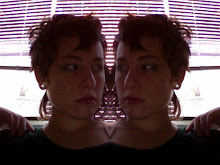Joakim holding one of the little chicks at Oventic (except he looks like he might be trying to love it to death instead)
I just came back from one of the markets with our professor Tom who lives with us some of the time and Maria. We were buying tons of vegetables which we will be preparing all day on Thursday to thank the caracol. We are making enough beef stew with tortillas, hibiscus tea and arroz con leche to feed 250 hungry people. I ate a guayaba and while I normally find it's impossible seeds and slimy texture unappetizing, this somewhat not ripe one was delicious. They taste like a hybrid between a pear and a citrus fruit, sort of tart yet still sweet. A kilo of hibiscus cost less than a dollar.
This week we visited San Pedro Polhó, an autonomous municipality and refugee center for those affected by PRI and paramilitary threats. The community is near Acteal, where the massacre in 1997 occurred killing 45 people, including many women and children, who were members of the pacifist group Las Abejas (“The Bees”). The massacre was the climax of tension between the Zapatistas and paramilitaries. We hiked up a small mountain and at the summit we saw Acteal.
This is our last week in Oventic. This weekend is International Women's Day and there is a huge festival here. Women are invited to take part in all sorts of activities and programs while men are invited to clean, watch children, and cook.
I've also thought quite a bit about my senior project and I think I may analyze the reception of Palestinian solidarity movements and Zionist organizations on college campuses from an anthropological perspective. Within the past two days, this became more of a reality especially when we arrived in San Cristobal yesterday. I was walking around, buying some groceries, passing the usual “SOLIDARIDAD” graffiti with stencils of a face covered by a keffiyeh (the traditional scarf worn in many Arab communities), with “solidarity” presumably written in Arabic underneath. Then, I saw “[Star of David] = [Swastika]” spray painted right near the pharmacy. My rationale dictates that I consider the recent occupation in Palestine to be wrong. I am constantly reading articles and having conversations with people about the meaning of land, of history. I can say I am confident in my own beliefs, but when I see that on the side of the building, my identity is completely threatened. I cannot help but feel angry, but it's not as easy to explain with the word “anger”. I am angry because those sort of messages only reflect violence and hatred, which are counterintuitive in the process of creating peace.
I feel connected to the Middle East in a way that the struggles from both perspectives resonate within me in a consuming manner. The Magen David (Star of David) is not simply a symbol for the “politicized” conception of Israel, projecting feelings of colonization, but of the Jewish people on the whole (the synecdochic Israel). But at the same time I still find myself pretty confused with how I can focus all these feelings into a year long thesis. We will see.
Disengaging with Zionism (Issa Mikel, The Electronic Intifada, 13 September 2005)
Articles about Antisemitism Vs. Critiques of Israel from Jews Against the Occupation here.
This week we visited San Pedro Polhó, an autonomous municipality and refugee center for those affected by PRI and paramilitary threats. The community is near Acteal, where the massacre in 1997 occurred killing 45 people, including many women and children, who were members of the pacifist group Las Abejas (“The Bees”). The massacre was the climax of tension between the Zapatistas and paramilitaries. We hiked up a small mountain and at the summit we saw Acteal.
This is our last week in Oventic. This weekend is International Women's Day and there is a huge festival here. Women are invited to take part in all sorts of activities and programs while men are invited to clean, watch children, and cook.
I've also thought quite a bit about my senior project and I think I may analyze the reception of Palestinian solidarity movements and Zionist organizations on college campuses from an anthropological perspective. Within the past two days, this became more of a reality especially when we arrived in San Cristobal yesterday. I was walking around, buying some groceries, passing the usual “SOLIDARIDAD” graffiti with stencils of a face covered by a keffiyeh (the traditional scarf worn in many Arab communities), with “solidarity” presumably written in Arabic underneath. Then, I saw “[Star of David] = [Swastika]” spray painted right near the pharmacy. My rationale dictates that I consider the recent occupation in Palestine to be wrong. I am constantly reading articles and having conversations with people about the meaning of land, of history. I can say I am confident in my own beliefs, but when I see that on the side of the building, my identity is completely threatened. I cannot help but feel angry, but it's not as easy to explain with the word “anger”. I am angry because those sort of messages only reflect violence and hatred, which are counterintuitive in the process of creating peace.
I feel connected to the Middle East in a way that the struggles from both perspectives resonate within me in a consuming manner. The Magen David (Star of David) is not simply a symbol for the “politicized” conception of Israel, projecting feelings of colonization, but of the Jewish people on the whole (the synecdochic Israel). But at the same time I still find myself pretty confused with how I can focus all these feelings into a year long thesis. We will see.
Disengaging with Zionism (Issa Mikel, The Electronic Intifada, 13 September 2005)
Articles about Antisemitism Vs. Critiques of Israel from Jews Against the Occupation here.
marlena and I loving a chick
